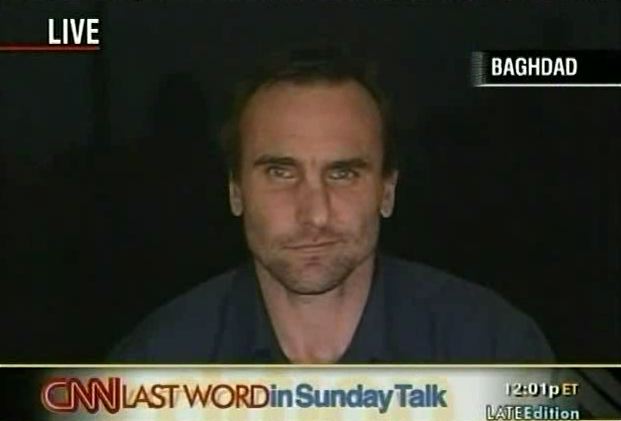LE: Ayad Allawi continues to position himself as Maliki successor

Length: 5:53
LARGE (68.9 MB) ----- SMALL (6.8 MB)
WOLF BLITZER: Welcome back. We'll get to my interviews with two presidential candidates, Bill Richardson and Sam Brownback, in just a moment. First, though, let's go to Baghdad.
Our correspondent, Michael Ware, is standing by for some special insight into what's going on in Iraq right now and what we've just heard during the first hour of "Late Edition."
Michael, we heard the former interim prime minister of Iraq, Ayad Allawi, in an exclusive Sunday interview here, suggest that it's over with for Nouri al-Maliki, the prime minister; he's simply not up to the job.
Listen to this little clip of what Ayad Allawi told us.
(BEGIN VIDEO CLIP)
ALLAWI: I am not doubting whether he's a good guy or not a good guy. But I am doubting the system of militias, of sectarianism, of trying to avoid the benchmarks which President Bush and the Congress have laid down for the government in Iraq. And I cannot see that this government will implement the benchmarks.
(END VIDEO CLIP)
BLITZER: All right, Michael, what do you think? You've been there for four years-plus. No one knows the situation better on the ground on a day-to-day basis. What do you think of what we're hearing from Ayad Allawi right now about Nouri al-Maliki?
MICHAEL WARE, CNN CORRESPONDENT: Well, I think the former prime minister's assessment is right.
Now, remember, Wolf, Ayad Allawi has been a stalwart for American support all through the '90s and since the invasion. Indeed, he's arguably America's closest political ally.
And if you listen to what the former prime minister says, he's not condemning Maliki personally, but the whole process. He's saying that the system, the government, the institutions that have been implanted here are not working.
Now, that's an assessment that we now know is shared by some very senior generals here on the ground in Iraq -- that's American generals.
And let's have a look at Dr. Allawi's past. In the mid-1990s, he and the CIA attempted a coup d'etat against Saddam Hussein. Then last year, in the summer, I interviewed Dr. Allawi, and at that time he told me Iraq did not have a real democracy and perhaps it had come too quickly for Iraq to digest. He was saying the system was failing.
Then, in February this year, he told me he'd just returned from Washington, D.C., where he told American policy-makers that, if the surge does not work, you need to consider installing an emergency government.
Now, Dr. Allawi told me that the response from the administration was not a yes, but it was not a no. And now we're hearing generals saying that maybe democracy is not working, and the embassy saying we're pursuing less lofty and ambitious democratic goals.
BLITZER: Well, is Dr. Allawi, Michael, the so-called strongman that the Iraqis might need to pick up the pieces right now?
WARE: Well, Dr. Allawi certainly is shaping himself as one of the key candidates. But I've known Dr. Allawi for years; he's been shaping himself that way since I've known him. And certainly, he's been close to certain American security agencies. They've certainly bet on him in the past.
And indeed, during the attempted coup d'etat in the 1990s, he did that with another Iraqi who had left Saddam's regime, General Muhammad Abdullah al-Shahwani. General Shahwani is currently the head of the Iraqi intelligence service, an intelligence service run and funded by the CIA, over which the Iraqi government has no control whatsoever.
Dr. Allawi has appealed to the Baathists and to the Sunnis and to secular moderates within the country and some Shia, all of whom were essentially abandoned by American support during elections, while Iranian-backed parties were flooded with money and Iranian support.
BLITZER: What did you think of what we heard from General Odierno, suggesting that some progress, in fact, is being achieved on the battlefield against Al Qaida in Iraq and other elements there?
Because the critics, a lot of critics, are suggesting, yes, there may be some progress, but it won't make much difference in the long run, as long as that sectarian rift that exists between the Sunni, the Shia, and the Kurds continues to exist.
WARE: Yeah, well, General Ray Odierno very much has his finger on the pulse of this war, and his assessment is entirely correct.
Yes, there has been some stabilization, some spectacular examples, like in al-Anbar province. Yes, it's forced changes in the type of violence that we're seeing here.
But Iraqi innocents are still dying in their hundreds and thousands every month. And what we're failing to address is, how are we achieving these successes in bringing down the violence? It's by cutting a deal with the tribes, the Baathists, and the Sunni insurgents. It's by creating Sunni militias to counteract the government's own militias and the Iranian-backed militias. That's bound to have long-term consequences.
In many ways, part of what's being achieved is because America is turning somewhat -- despite its rhetoric -- against this government: fostering Sunni militias, questioning the role of this government, questioning whether it can actually perform.
And we Ambassador Crocker, just the other day, say that if Prime Minister Nouri al-Maliki does not deliver, then American support is not at the end of a blank check. So he's threatening the prime minister.
BLITZER: Michael Ware, reporting for us from Baghdad.
Michael, stay safe over there. Thanks very much.
